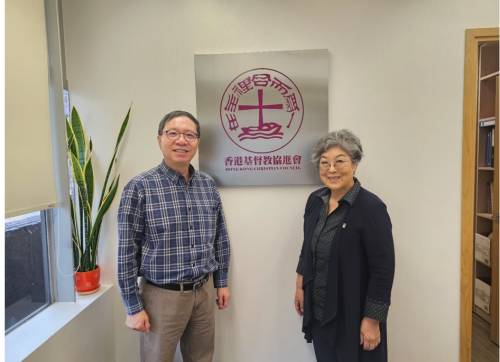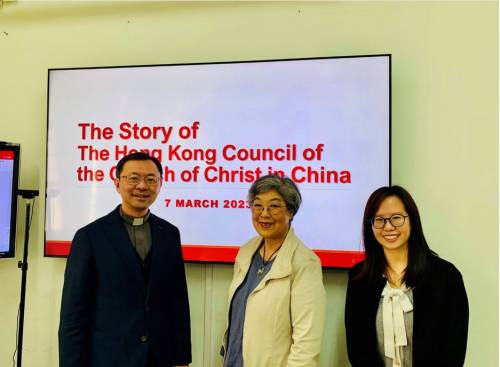A Letter from Unzu Lee, serving as Regional Liaison for East Asia
Summer 2023
Write to Unzu Lee
Individuals: Give online to E132192 in honor of Unzu Lee’s ministry
Congregations: Give to D500115 in honor of Unzu Lee’s ministry
Give online: pcusa.org/unzu-lee
Subscribe to my co-worker letters
Dear companions on the journey of faith,
Here in Korea, the days are getting longer and warmer. Most of the flowering trees have completed their season of blooming, and their limbs are now being clothed with thick layers of green leaves. In the meantime, I hope you have been well sustained by God’s faithfulness. Because of your faithful accompaniment, I am doing well. I have started the fourth year of my service as regional liaison for East Asia, and this past March, I was finally able to travel to Hong Kong to meet with PC(USA)’s partners in Hong Kong.

Hong Kong Christian Council with Dr. Simon Fung, the Honorary General Secretary of HKCC
It had been a long wait. In the meantime, I read, listened to a few Hong Kongers who came to Korea, and even went to Karlsruhe, Germany to meet with the Hong Kong Church delegates at the WCC Assembly last September because I wanted to understand the situation of Hong Kong. One thing that came through clearly was that everyone was concerned about the trend of emigration which caused a brain drain from Hong Kong. However, it seemed that a variety of opinions existed among Hong Kongers themselves about the situation of Hong Kong. Therefore, I went to Hong Kong with a deep desire to learn more.
The taxi I got on at the airport dropped me off at a hotel right in the middle of a business district. Hong Kong is a cosmopolitan city as I remembered it being. It was bustling with commerce at the center of its life. On the morning of March 5, Joel, the son of the Rev. Judy Chan, a retired mission co-worker of the PC(USA) who makes her residence in Hong Kong, came to my hotel to be my guide. Our trip to the Chung Chi College Chapel started my journey of encounter with our partners in Hong Kong.
Who are our partners? The Hong Kong Christian Council (HKCC) and the Hong Kong Council of the Church of Christ in China (HKCCCC) are PC(USA)’s main partners in Hong Kong. In addition, the Divinity School of the Chung Chi College and the PC(USA) have a special relationship as PC(USA) often sends mission co-workers to teach at the Divinity School when there is a need. In fact, as recently as less than two years ago, Rev. Myung Ho Yang taught liturgy and sacred music at the Divinity School. During my time in Hong Kong, I connected with HKCC, HKCCCC, the Divinity School of the Chung Chi College, and the Hong Kong Christian Institute (HKCI). Throughout all these visits, I was accompanied by Judy who did everything to make sure that I got to my appointments on time.

Hong Kong Council of the Church of Christ in China with Rev. Ray Ka Fai Wong, the General Secretary of HKCCCC and Ms. Amanda Cheung
HKCC is an ecumenical council of 21 member churches and organizations and will be celebrating its 70th anniversary next year according to Dr. Fung Siu-hung (Simon) who took the helm of the HKCC as its Honorary General Secretary starting July 1, 2022. In addition to engaging in a variety of ministries for justice and peace and ecumenical formation among Christians, I learned that HKCC is very serious about interfaith engagement. HKCC has been part of the interfaith dialogue for 40 years with other five religions—namely, Taoism, Buddhism, Catholicism, Islam and Confucianism.
HKCC also plays a role in Hong Kong’s political context in a variety of ways. For instance, it nominates 10 Christian electors (out of 60 electors allotted for the religious sector) for the city’s Electoral Commission. It speaks on behalf of the Christians when the changing political terrain calls for it. As you are aware, Hong Kong is neither a Chinese city nor an independent country at this time. It is a Special Administrative Region (SAR) of China along with Macau. When the National People’s Congress of China adopted a resolution on May 29, 2020 to propose the National Security Legislation for Hong Kong, for instance, HKCC issued a response expressing its views and called on the Hong Kong Christian community to share their perspectives on the content of the proposed legislation.

Hong Kong
HKCCCC needs to be understood in the changing political context of Hong Kong in relationship to China as well. Previously the Sixth District Association of the Guangdong, HKCCCC came into being in 1954 because the Sixth District Association could no longer maintain its connection with the Guangdong Synod when the Chinese Communist Party took over mainland China in 1953. So it reorganized itself into HKCCCC. Unlike HKCC, HKCCCC is a church. It is a denomination of 72 local churches with a particular emphasis on educational ministry. According to the Rev. Ray Ka Fai Wong, the current general secretary, as many as 16,000 students are enrolled in secondary schools affiliated with the HKCCCC.
On the question of whether Hong Kongers enjoy political freedom, some of the people I talked to said “yes,” but others said “no.” It is clearly not a question I as a visitor could answer. On the question of religious freedom, however, I, as a visitor, felt that there was a great deal of freedom, albeit the fact that the sermon I heard was not political at all. But then, how does one explain the trend of emigration? Rev. Wong of the HKCCCC gave me a clue. He said that the division between the rich and the poor is an urgent issue and that even the middle class is eroding.
It is clear that underneath the glittering lights that shine in the bustling business districts of Hong Kong, there is poverty. As we journey on and pray “Give us our daily bread,” may we remember the poor in Hong Kong and everywhere because bread is to be shared among all. It is clear that underneath the glittering lights that shine in the bustling business districts of Hong Kong, there is poverty. As we journey on and pray “Give us our daily bread,” may we remember the poor in Hong Kong and everywhere because bread is to be shared among all. To me, this means that we ourselves have to become the bread that gives life. I also invite you to pray with me for true security for all those for whom Hong Kong is home.
Prayerfully,
Unzu
![]() You may freely reuse and distribute this article in its entirety for non-commercial purposes in any medium. Please include author attribution, photography credits, and a link to the original article. This work is licensed under a Creative Commons Attribution-NonCommercial-NoDeratives 4.0 International License.
You may freely reuse and distribute this article in its entirety for non-commercial purposes in any medium. Please include author attribution, photography credits, and a link to the original article. This work is licensed under a Creative Commons Attribution-NonCommercial-NoDeratives 4.0 International License.